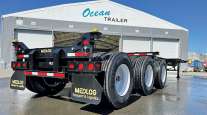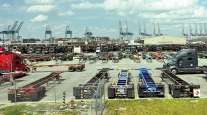Intermodal Carriers Feel Strain as Chassis Shortages Surface
This story appears in the Jan. 17 print edition of Transport Topics.
Spot shortages of intermodal chassis are surfacing and uncertainty is building about the future chassis supply as truckers take more responsibility for the equipment that traditionally came from ocean carriers, industry officials said.
The strains are emerging early in 2011 because intermodal demand recovered strongly during 2010 and no new equipment has been added yet to the chassis fleet, truckers, leasing companies and manufacturers told Transport Topics.
“We are seeing chassis shortages in the Northeast and the Chicago area,” said Chris Giltz, vice president of operations for the Evans Network of Cos., a nationwide drayage operator. “We are having to reschedule some loads and turn down some loads because chassis aren’t available.”
Evans has had some one- or two-day delays and turned down fewer than 10 loads a week, as ocean carriers other than Maersk reduced supply, he said.
Another fleet executive echoed the message.
“I can see a chassis shortage coming — we already are having to go to multiple places to find chassis,” said Kevin Lhotak, president of Reliable Transportation Specialists in suburban Chicago.
The chassis industry’s transformation began in 2009, as biggest ocean carrier Maersk Inc. began to rent them and new federal chassis safety rules promised to increase maintenance costs, discouraging other ocean carriers from supplying them.
Lhotak predicted that shortages will emerge in the first quarter, which traditionally is the slowest of the year for intermodal.
“The volumes are picking up,” Lhotak said. “A lot of people are getting out of the chassis business. When the chassis are junk, [ocean carriers] are not replacing them.”
“We are in a transition period,” he said. “Our industry is looking for a solution.”
The lack of a solution is prompting leasing companies — which are emerging as a key alternative to ocean carriers — to look carefully at equipment purchases.
“We are waiting to see where the market goes before we build more chassis,” said John Mizerek, vice president of sales for lessor Flexi-Van, stressing that the Kenilworth, N.J., company plans to increase its fleet in 2011 as it develops trucker-oriented products.
“One of the keys is going to be the Pacific [freight] contracting season,” he explained, as ocean carriers and shippers negotiate new pacts between March and May.
“The question is,” Mizerek said, “how do the steamship lines address chassis in those new contracts? Is there going to be a strong push to remove chassis supply obligations?”
Flexi-Van, which didn’t order any new chassis last year, said it has been able to meet 2011 demand despite a shortage of mechanics to repair chassis.
Mizerek acknowledged that spot shortages can occur as equipment stored during the recession is put back into service.
Steve Rubin, president of lessor Trac Intermodal, also spotlighted changing market dynamics.
“The combination of the rebound in intermodal traffic, and downsized ocean carrier fleets, led to tight supply/demand metrics during last year’s peak season,” Rubin said, leading to “very temporary” shortages in September that were addressed by adding suppliers, parts and workers.
“We did not actively purchase any marine chassis in 2010 because there was sufficient supply to meet demand,” said Rubin. “There is adequate supply [in 2011] throughout the system as long as equipment is managed properly.”
“The chassis system must work efficiently throughout this transition” to a trucker model, he said. “We will keep all options open to ensure the new model takes place in 2011. We have been working closely with our customers the last several months to develop longer term forecasts that will allow us to meet anticipated chassis needs in 2011 and 2012.”
One step Trac is taking right now is an agreement to provide chassis for truckers to rent in the Southeast for international shipments by CMA CGM, the third-largest ocean carrier, as CMA moves away from chassis supply.
Curtis Whalen, executive director of American Trucking Associations’ Intermodal Motor Carriers Conference, sympathized with fleets and lessors.
“The big question is: Who is going to be the major provider, whether it is leasing companies or chassis pools?” Whalen asked.
“The investment decision is going to be looked at differently,” he said. “The motor carrier didn’t care before if the ocean carrier chassis was being used as storage — it wasn’t his. If it’s the trucker’s piece of equipment, he wants to keep it moving.”
“If I was an entrepreneur, I wouldn’t want to jump into this,” Whalen added. “If you don’t know what business model is going to survive, why would you invest?”




